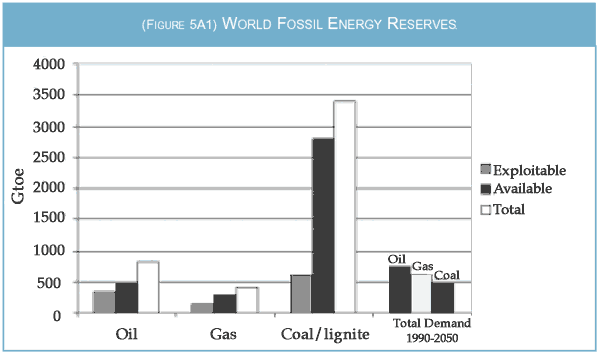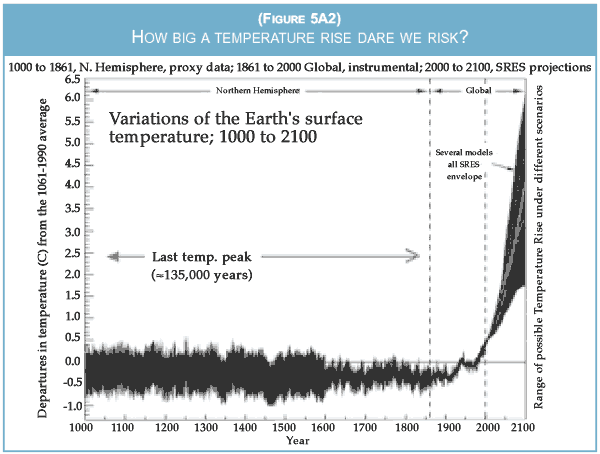
The Irish state electricity company believes that global climate change rather
than oil and gas depletion will force Ireland to move to a sustainable energy
system. Building the latter, it says, will be a political and ideological exercise
as much as a technical and economic one.
The social and economic development of
human societies is inextricably linked to energy
use. However, in developed countries today the
linkage between growth in energy consumption
and economic growth shows signs of de-coupling.
Nonetheless it is doing so at a level (4.7
toe/capita in the OECD) that is significantly
above the current energy consumption levels of
the least developed countries (0.6 toe/capita in
Africa). The continued growth in global population
and the justifiable demand for all humans
to have access to energy will ensure that total
annual global energy consumption will continue
to increase well into the future (from approximately
10 Gtoe p.a. in 2000 to 25 Gtoe p.a. in
2050) under business-as-usual conditions. In
this context, the recent World Summit on
Sustainable Development (WSSD) in
Johannesburg placed heavy emphasis on the
need for developing countries, with the support
of developed countries, to create energy systems
that are 'reliable, affordable, economically
viable, socially acceptable and environmentally
sound' as an essential element in eliminating
poverty.
These five requirements essentially define the
basis for the sustainable energy systems that
will be put in place to serve the majority of
humanity for the next 40-50 years. While
emphasising a strong role for energy efficiency,
conservation and renewables, the WSSD recognised
the continuing dominant role that fossil
fuels will play. In terms of energy supply, even
under high growth scenarios, no shortfall in
coal, oil or gas supplies is anticipated given current
estimates of proven reserves and projected
resources (e.g. WEC/IIASA, Shell forecasts).

However, sustainability addresses more than energy supply and it is recognised that the limiting resource in the future will be the capacity of the biosphere to absorb emissions from the extraction, transformation, distribution and use of fuels.
The requirements for sustainable energy applied by the WSSD reflect substantively the three pillars of Ireland's domestic energy policy - competitiveness, security and environmental protection. The issue today is what pressures apply in the developed world that will drive the shape of global energy systems up to and beyond the 2050 period. Assuming reserves of fossil fuels are not a critical factor then it is supply security, cost and, above all, environmental factors which will mould future global energy systems.
The goal of the UN, individual governments and consumers is to have available a reliable supply of energy to meet the current needs of individuals for heat, light, power, transport and electrical energy. No international agency is suggesting that any other societal imperative justifies measures to ration energy supplies by curtailing their availability or reliability. The availability and reliability of energy services are satisfied through functioning distribution infrastructures with fuel and source diversity supporting transparent energy markets.
Significant investments are required to keep in place the various infrastructures needed for energy delivery including extraction, transformation (electricity generation), transportation, distribution and use. The recognised concerns affecting security of supply relate to geo-political instability and, in those sectors where market structures have not been well established, regulatory risk. Concerns in relation to Middle East oil or North African or Russian gas are well recognised and, to the extent political events in these regions affect the continuity of supplies (and fuel prices), they drive the exploration cycle in more stable regions of the globe. More interesting in the short-term will be the effectiveness of new energy regulatory regimes in providing the necessary stability and incentives for investment in the recently liberalised energy sectors (gas and electricity). Significant teething problems are being encountered in these two areas which have important contributions to make in moving towards and facilitating sustainable energy supplies.
Additionally, supply security must be subject to societal expectations. In this context, nuclear energy is not considered a desirable component of the energy mix in certain countries. Equally, some societies may place greater value on other objectives (e.g. the preservation of unspoilt landscapes) above the exploitation of available renewable resources (wind, monoculture biomass).
Affordable energy is a key goal of policy-makers. In more developed countries affordability relates primarily to industrial/commercial consumers with the objective of maintaining national economic competitiveness. However, affordable energy for consumers must also be economically viable from an investor perspective if affordability is to be sustained over the long-term and sufficient support for research and development of new technologies is to be provided. As with energy security, the primary risks to affordable energy relate to supply and/or market failures.
As noted above, the impact of energy extraction,
transport, transformation and use on the
environment is the main driver for change in an
energy system that effectively meets the current
economic and social needs of developed countries.
The global issue of climate change (the
capacity of the atmosphere to absorb increasing
amounts of CO2) and policy responses in this
area will provide the major impetus towards
long-term energy sustainability, moderated by
the need to maintain security and affordability.
The Kyoto Protocol to the UNFCCC establishes,
to a degree, a carbon constrained future well
ahead of any physical shortages of fossil fuels.
For the developed world the Kyoto Protocol
will require progressive reductions in the carbon
intensity (tCO2/$GDP) and energy intensity
(GJ/$GDP) of national economies to sustain
economic growth into the future. In the longer
term all economies will face an environmental
carbon constraint. In essence this means
greater efficiency will be required in the patterns
and systems of fossil energy transformation
and end use. It will require progressive
reduction in the reliance on fossil fuels and their
substitution by renewable energies, hydrogen
and, in countries where it is deemed acceptable,
nuclear power. In the interim it will involve a
greater dependence on gas.
 |
Source: IPCC, Third Assessment Peport, 2002 |
The key issues facing developed economies are the related factors of the speed and cost of transition to an environmentally driven sustainable energy system given the current distance from the desired objective of stabilisation of CO2 in the atmosphere at a level that will not cause irreparable damage to the planet. Because policy responses will impact on individuals, most notably in terms of increased energy cost, building the basis for a sustainable energy system will be as much a political and ideological exercise as it is a technical and economic one. Recent experience with the Nice Referendum is hopeful, suggesting that debate can facilitate the public in ordering priorities on complex issues such as this.
However, by placing a price on CO2 the Kyoto Protocol provides the most significant step at present towards developing a sustainable system. Kyoto provides the necessary conditions to promote energy efficiency, conservation, renewable energy and technological research and development by requiring that the externality cost associated with climate change be included in energy prices and providing for this to be addressed in a market-based framework. It is therefore critical that the Kyoto Protocol be seen to succeed as its collapse will stall the political drive necessary to achieve a sustainable energy future.
The key risk in implementing measures to comply with the Kyoto Protocol is the scale and timing of the impact they will have on energy prices. Sudden, large-scale increases in energy prices brought about by rapid stranding of energy infrastructure assets (e.g. electricity generation, distribution systems) will cause social and economic difficulties and, possibly, the collapse of the Kyoto Protocol. The main restraint on this is the linkage of the Protocol requirements with market mechanisms that will facilitate the transition to an environmentally sustainable energy system in an economically logical fashion. Nonetheless, care is required in designing the market systems necessary to implement the Protocol in order to avoid market failures. Despite major progress to date in the development of the proposed emissions trading Directive, which will provide the main vehicle for implementing Kyoto in the EU, significant weaknesses remain in relation to the proposals for market management that could yet result in its collapse.
Ireland will not determine the technological global pathway to sustainable energy. It is a technology taker rather than an innovator due to the scale of investment in research and development required to radically restructure its energy systems compared to the size of its economy and its openness to global forces. Ireland can shape the path internally to one that best suits its economy and society. A number of elements will be required in order to do so including the following:
In the end we must all accept and respond to the
fact that the global environment must be capable
of sustaining the world the global economic
game is creating.
This is one of almost 50
chapters and articles in the 336-page large format book, Before the Wells
Run Dry. Copies of the book are available for £9.95 from Green Books. Continue to Part B of section 5:The challenge to the National Grid in coping with renewable power
